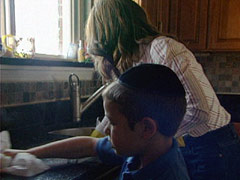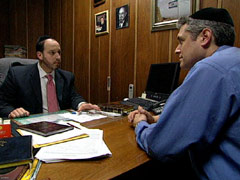Preparing for Passover
BOB ABERNETHY, anchor: Monday night (April 2) Jews begin observing Passover, the commemoration of their ancestors’ deliverance from slavery in Egypt when they got out so fast there was no time for bread to rise. Observant Jews prepare for Passover — Pesach — by getting rid of everything in the house that is chametz — leavened. They even sell such food, symbolically, until Passover ends. We visited the Orthodox Jewish family of Ari and Shoshana Lerner in Pikesville, Maryland.
Rabbi ARI LERNER: Cleaning for Passover is a big adventure in most Orthodox homes. It typically starts weeks before the actual holiday and everybody gets involved and pitches in.
Passover is really the touchstone event in Judaism, and this gives an opportunity for families, parents and children alike, to really engage in a sort of preparation for the holiday as a whole. So everything ranging from, you know, cleaning out cabinets, countertops, bedrooms, going through dresser drawers, looking through books that may commonly be used in the areas where there’s food present or at tables while the kids are, you know, eating dinner, etc., and closets, pantries — all that kind of stuff is really gone through extensively to make sure that, within the spirit of the law and the letter of the law, that there’s no leavened material in the house.
 It’s imperative that all the surfaces and everything that you use are completely kosher for Passover, because there can be no presence of chametz left. So, for example, stainless steel sinks need to be completely cleaned out thoroughly, let sit for 24 hours, and then boiling water is poured over all the surfaces of the sink.
It’s imperative that all the surfaces and everything that you use are completely kosher for Passover, because there can be no presence of chametz left. So, for example, stainless steel sinks need to be completely cleaned out thoroughly, let sit for 24 hours, and then boiling water is poured over all the surfaces of the sink.
Artificial surfaces such as Formica or Corian have to be covered.
We have a whole set of pots and pans specifically for Passover. We have dishes and knives, forks, spoons, cups, everything. Whatever we have during the rest of the year, we have one special set of that we only use for those eight days of Passover. Once we get things clean enough and we have areas that are clear of chametz, then we bring up those boxes and stock the shelves that we’ve already cleaned for Passover.
With regard to chametz that we’re going to keep in the house over Pesach, we typically collect it in certain locations, certain cabinets. We try to isolate it into closed off areas, and we actually have to sell that to a non-Jewish person for the duration of Passover.
 Congregational rabbis will do it en masse for their congregations. People will come with a list of the locations that they have chametz in their house that they plan on selling.
Congregational rabbis will do it en masse for their congregations. People will come with a list of the locations that they have chametz in their house that they plan on selling.
Rabbi SHMUEL SILBER (Suburban Orthodox Congregation): So, you agree to employ me as your agent.
Rabbi LERNER: I’d be honored.
Rabbi SILBER: Good. So that verbal agreement, as well as your signature on this power of attorney, are enough to go ahead and formalize our relationship — me as your agent to sell the chametz on your behalf.
Rabbi LERNER: All of our preparation before Passover gives us the sense that we are preparing ourselves for some type of exodus.
SHOSHANA LERNER: The Exodus story is one that we tell to our children every single year. We have an obligation to tell that story over to our children, and that gets us, you know, involved in the Passover cleaning, and it actually gives the children a lift.
Rabbi LERNER: Passover season is really an indication of our freedom. It’s a time where we reflect on God’s role in our world. It gives us a tremendous opportunity to connect with family and with friends and with our religion and with ourselves.

